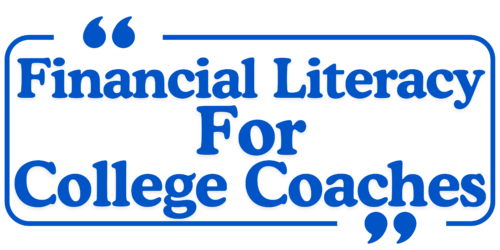Our Services
Frequently Asked Questions
Financial literacy for college coaches encompasses the knowledge and skills needed to make informed financial decisions. It includes understanding contracts, retirement planning, budgeting, investments, taxes, and other financial topics relevant to the coaching profession.
Financial literacy is crucial for college coaches as it empowers them to effectively manage their finances, maximize their earnings, and plan for their financial future. Understanding financial concepts can lead to better decision-making regarding contracts, investments, and retirement.
Our curriculum covers a wide range of topics, including contract negotiation, retirement planning, budgeting and cash flow management, investment strategies, tax planning, insurance literacy, estate planning, and more, all tailored specifically for college coaches.
Financial literacy equips you with the knowledge and skills to understand the terms of your contract, evaluate benefits, and identify areas for negotiation. This can lead to more favorable contract terms, including salary, benefits, and perks.
We provide a variety of resources, including articles, workshops, online courses, and one-on-one consultations, all designed to help coaches understand financial concepts and apply them effectively to their careers.
Yes, we offer personalized financial advice tailored to the unique needs and circumstances of college coaches. Our services include financial planning, investment strategies, and retirement planning to help you achieve your financial goals.
Absolutely! Financial literacy plays a vital role in retirement planning, helping coaches understand retirement account options, create a savings strategy, and ensure they are adequately prepared for a comfortable retirement.
Common financial mistakes include not saving enough for retirement, failing to negotiate contracts effectively, underestimating tax liabilities, neglecting insurance needs, and not diversifying investment portfolios.
To get started, explore our website for resources and articles, sign up for our workshops, or consider scheduling a consultation with one of our financial advisors who specializes in working with college coaches.
While some resources, such as workshops and consultations, may have associated fees, many articles and educational materials on our website are available for free. We strive to provide accessible information to help all college coaches improve their financial literacy.


